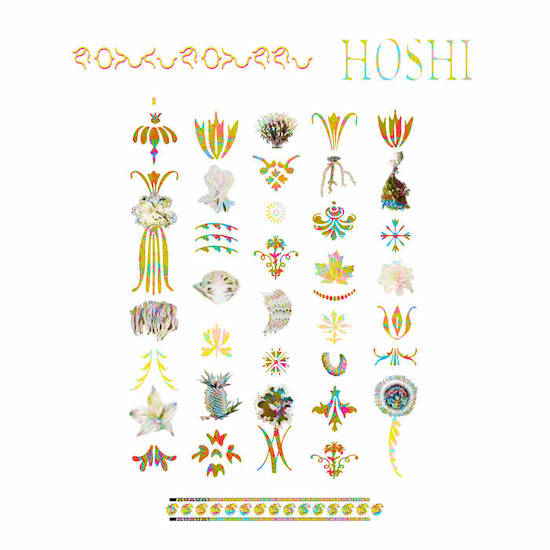An impressive multi-part glass mosaic
currently adorning the Turtola tram stop in Tampere, Finland, is a perfect example of the connecting threads that run through Jan Anderzén’s work. The Finnish multi-media artist, musician, and producer has been making music with his avant-garde sound group Kemialliset Ystävät (‘Chemical Friends’) since 1995 and releasing solo recordings under his Tomutonttu (‘Dust Gnome’) alias since 1996. The last three releases under the Kemialliset Ystävät name have all been excellent, particularly 2018’s Siipi Empii, and undoubtedly deserving of wider recognition. I’ve considered myself to be a fan for over a decade now and yet that last album passed under my radar until about six months after its release. Whether Ystävät or Tomutonttu, Anderzén’s music is pretty unique stuff and shares a commonality neatly expressed by his artwork, which usually adorns the covers of his albums and acts as a visual analogue for the sounds contained within.
Hoshi’s opening track, ‘Jo alkaa niitty tyhjentyä’, begins with a pulsating rhythmic loop that sounds very similar to something from an Ystävät album, although I can’t pinpoint which track exactly that is. Both Anderzén’s solo and group work has been steadily evolving over time, becoming less murky and less obviously dependent on treated vocal samples. Hoshi takes this trope to its logical conclusion, offering up twelve, mostly short, tracks of luminous electronica not entirely dissimilar in spirit to Harmonia’s classic debut, Musik Von Harmonia.
‘Viesti’ evokes a dense swarm of winged insects before becoming an electronic analogue of encoded birds twittering beside a burbling digital stream. ‘Katse osuu sähköön’ flirts slightly with glitch, its gentle bell-like sounds over-resonating as if stuck, the overall hum punctured intermittently by a noise like a car alarm. ‘Puissa roikkuvat elämät’ is possessed of a kind of insectoid propulsiveness, certain sounds seemingly moving backwards against the tide of many tiny marching legs, a microcosm encapsulated in its five-minute running time.
‘Malta lausua “AH”’ is perhaps the album’s most simple and beautiful track, an ambient alien vista with unknown creatures twittering and croaking in the distance. ‘Kun puhut kovaa nuotiolla’ is the sound of transition between worlds, Anderzén’s hand conspicuous on the dial, switching between channels. Final track, ‘Kyyti jatkuu’, feels as if the listener has finally arrived in some other, benevolent, but still slightly disorienting dimension.
Hoshi, the seventh album by Tomutonttu, is another fine example of its creator’s singular talents. More accessible but still as unique as its predecessors, this is an album that deserves to be heard by everyone with an interest in unconventionally beautiful electronica.


